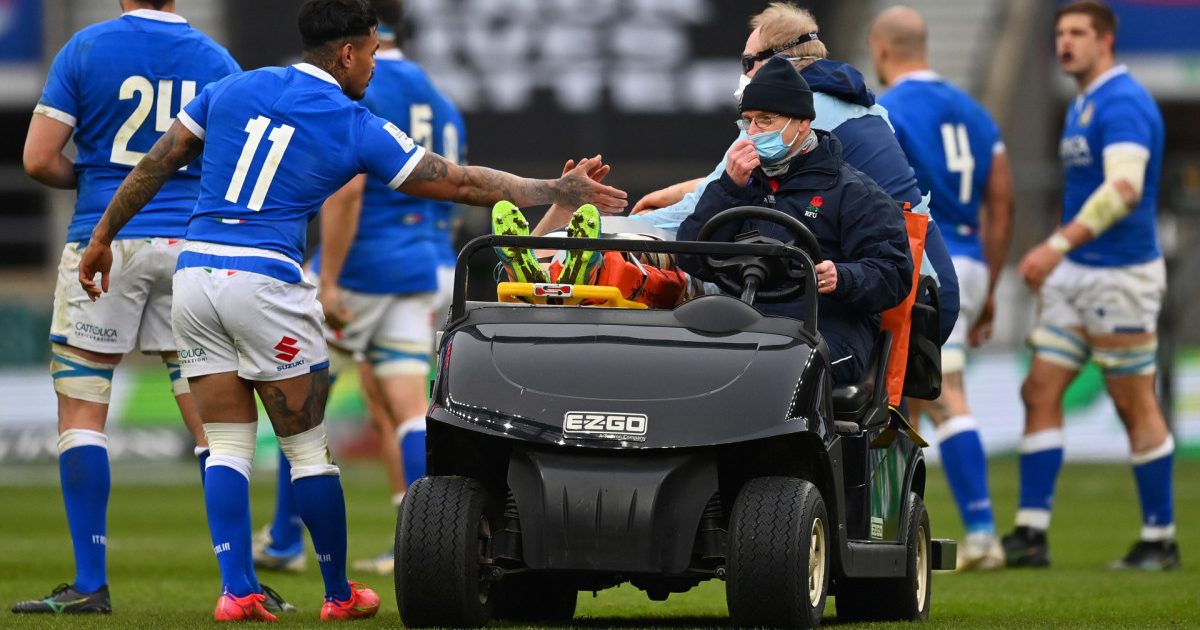'The laws should change NOW' - calls for action after 'horrible' Jack Willis injury

There have been calls to change the laws around ‘crocodile rolls’ and ‘can opener’ clearouts after a brutal looking injury to England flanker Jack Willis saw him stretchered off the pitch at Twickenham today.
England ran out winners against a resilient Italian side, but the injury to Willis has overshadowed the victory. Willis suffered a twisting injury to his knee and could be heard screaming in pain on the matchday audio. While the severity of the injury is not yet known, some speculate that the back row’s season could be over.
As it stands, variations of the practice are legal and are coached as an efficient technique to clear players from rucks, with video review of the incident cleared Italy of any wrongdoing.
While the technique is outlawed when used around the neck, there is still a gray area among officials when it’s used to twist torsos, judo style out of the way. Last year World Rugby attempted to address the issue, suggesting that there would be stricter officiating of laws 14 and 15 from July 2020, with particular focus on these areas:
Tackler (Law 14): 14.5 – must a) Immediately release the ball and the ball-carrier after both players go to ground and b) Immediately move away from the tackled player and from the ball or get up.
Ball Carrier (Law 14): 14.2 – Being brought to ground means that the ball-carrier is lying, sitting or has at least one knee on the ground or on another player who is on the ground. 14.5 – Tacklers must: d) Allow the tackled player to release or play the ball.
First arriving player (Law 15): 15.11 – Once a ruck has formed, no player may handle the ball unless they were able to get their hands on the ball before the ruck formed and stay on their feet. 15.12 – Players must endeavour to remain on their feet throughout the ruck.
Other arriving players (Law 15): 5 – An arriving player must be on their feet and join from behind their offside line. 6 – A player may join alongside but not in front of the hindmost player. 10 – Possession may be won either by rucking or by pushing the opposing team off the ball.”
Former Scotland lock Jim Hamilton called on authorities to change the laws to clamp down the maneuver, one that former Ireland coach Joe Schmidt dubbed ‘the can opener’. “Feel sick for Jack Willis. The laws should change NOW. Don’t allow players to roll out players in Rucks. So ****ing dangerous.”
Feel sick for Jack Willis.
The laws should change NOW. Don’t allow players to roll out players in Rucks. So f#^king dangerous. #ENGvITA— Jim Hamilton (Vice Captain) (@jimhamilton4) February 13, 2021
“And I rolled many players out. No criticism on players doing it. It’s currently legal. Some serious high profile injuries in the last few years. Dan Levy. Ellis Jenkins (I think) similar.”
And I rolled many players out. No criticism on players doing it. It’s currently legal.
Some serious high profile injuries in the last few years.
Dan Levy. Ellis Jenkins (I think) similar. https://t.co/Bdto1SqUlJ— Jim Hamilton (Vice Captain) (@jimhamilton4) February 13, 2021
“Why does rugby continue to allow exposed, vulnerable players on the jackal to be rolled sideways while their feet are planted?,” wrote rugby writer Jamie Lyall. “Jack Willis is one of the most flexible athletes in the game but his knees don’t bend laterally. Hideously dangerous and very avoidable.”
Why does rugby continue to allow exposed, vulnerable players on the jackal to be rolled sideways while their feet are planted? Jack Willis is one of the most flexible athletes in the game but his knees don't bend laterally. Hideously dangerous and very avoidable.
— Jamie Lyall (@JLyall93) February 13, 2021
Rugby and the Law tweeted: “It seems an appropriate time to share this again… Jack Willis suffers a horrible knee injury after a ‘crocodile roll’ at the breakdown. By the letter of the law, it’s illegal. But the laws aren’t properly applied. Feel terrible for Willis.”
It seems an appropriate time to share this again…
Jack Willis suffers a horrible knee injury after a ‘crocodile roll’ at the breakdown.
By the letter of the law, it’s illegal. But the laws aren’t properly applied. Feel terrible for Willis.#ENGvITA https://t.co/LoStlUgiP1
— Rugby and the Law (@rugbyandthelaw) February 13, 2021
A more explicit Law change could potentially outlaw the technique and leave less to referee interpretation.










































































